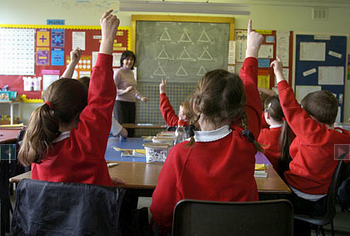PISA, strong on equity, but weak on positive teacher policy
The OECD’s 2015 PISA contains a range of strong and positive proposals on equity, tackling disadvantage and on the promotion of science teaching, but fails to adopt a coherent narrative on positive teacher policy.

“There is much in the latest PISA from the OECD which affirms just how important it is for countries to have strong thriving public education systems,” said Education International (EI) General Secretary Fred van Leeuwen on the outcomes of the Programme for International Student Assessment (PISA) published on December 6 by the Organisation for Economic Co-operation and Development (OECD). “Many of its proposals for improving equity are vital for the future of all young people.”
The EI General Secretary welcomed the proposals for targeting additional support for children of immigrants and disadvantaged backgrounds, and urge all governments to support them. The report's condemnation of gender stereotyping in Science rightly highlights how society's attitudes towards girls and Science can limit ambition, he said. Boys from lower socio economic backgrounds were also more likely to repeat years of schooling.
Students in advantaged schools have access to better materials and resources whereas students in disadvantaged schools have less teaching time and are more likely to be required to repeat grades, the report says, also emphasising that targeted additional resources will make a positive difference for students from disadvantaged backgrounds. Positive policies towards supporting the learning of young people from immigrant backgrounds can lead to major increases in students’ learning, although the majority of students from immigrant families have lower levels of achievement.
However, Van Leeuwen admitted his disappointment with the report's conclusions and tone around the use of resources for schools. “Higher public expenditure on education has not always delivered better results. This directly contradicts the need for sufficient resources. The best experts on resources are teachers themselves,” he said, adding that their voice is largely silent in this edition of PISA. Leaders are referred to again and again, but the teachers survey has barely been used. This is a missed opportunity.
Many school systems are still seriously underfunded, he deplored, stressing that it is to teachers themselves that governments should turn if they want to know what resources schools need and how to spend them wisely.
Education International strongly believes that the OECD must be very careful not to promote a false dichotomy between ensuring sufficient resources for schools and quality education. This contradicts OECD’s own proposals for targeted resources for immigrant students, education in the early years and disadvantaged students and equity in resource allocation. For EI, sufficient resources enable teachers to do their jobs, and a wise use of resources comes both from engaging the teaching profession and their unions in evidence informed policy development and evaluating the effects of education reforms.
The OECD urges that the priority must be to “attract and retain qualified teachers, and ensure that they continue to learn throughout their careers,” yet the OECD seem more confused than ever about the relationship between class size, teacher qualification and student achievement. Again, this goes against their own data where it unequivocally says, “in schools with smaller classes, students report that teachers can dedicate greater attention to individual students’ needs and knowledge, provide individual help to struggling students, and change the structure of the lesson if students find it difficult to follow”. Education International also regrets that the OECD has a narrow view of education systems, such as when it investigates the results of Shanghai students or Singapore’s students.
Education International clearly supports the focus on equity, disadvantaged students and the fact that the teachers in the public sector are for the first time acknowledged as the best in the world, gaining better results than their private counterparts when socioeconomic data is accounted for. However, the writing team has failed to take a nuanced view of the impact of qualified teachers, small classes and adequate resourcing on the development of quality education.
Source: Education International
- 372 reads
Human Rights
Ringing FOWPAL’s Peace Bell for the World:Nobel Peace Prize Laureates’ Visions and Actions

Protecting the World’s Cultural Diversity for a Sustainable Future

The Peace Bell Resonates at the 27th Eurasian Economic Summit

Declaration of World Day of the Power of Hope Endorsed by People in 158 Nations

Puppet Show I International Friendship Day 2020

